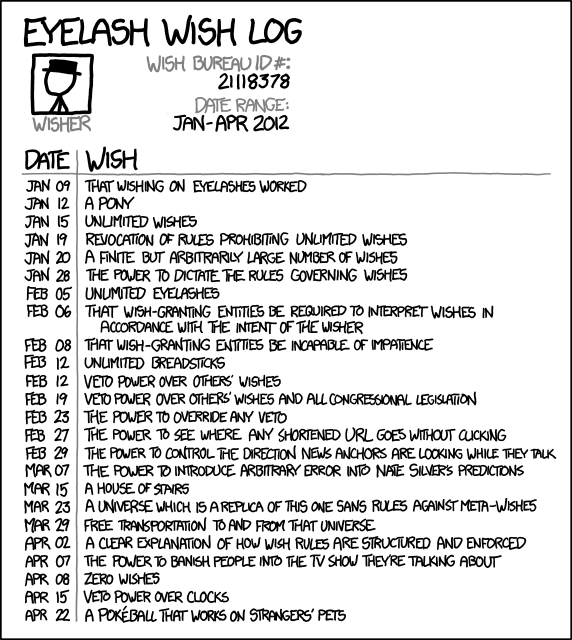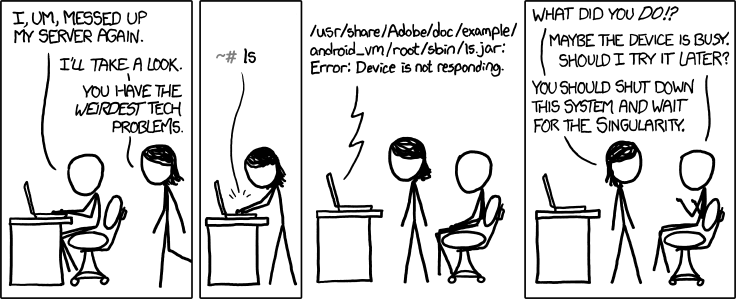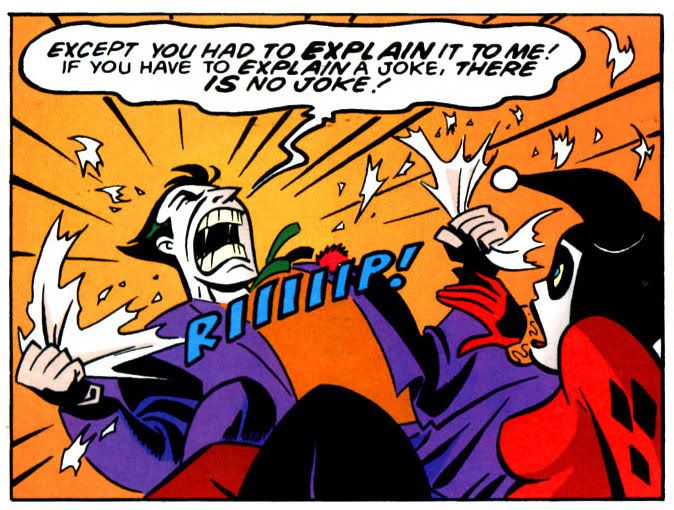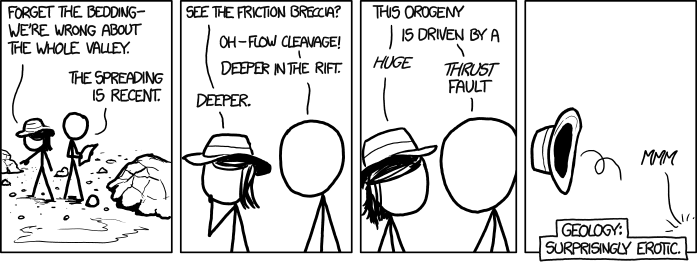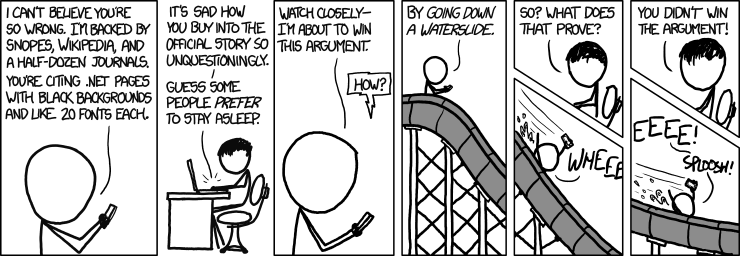Hey everyone! Sexy Online Retcon Critiquing Funnies Sometimes (SoRCFS) here after a long absence/silent lurking to pop back into my favorite stick-figure-based-webcomic criticism community hosted on Google Blogger.
Since I'm not yet over to criticizing the most recent Xkcd, I think I should also take up some space thanking the other authors of this blog for posting far more frequently than I have. Props especially to T-Jack for finding things to say about comics that are hard to criticize because they're more
Garfield-level bland than actually bad. Regarding my own lack of posts: while I want to blame it on some things (including getting my own comics published semi-professionally). Really, though, I can always find time to complain about things. I think it's that aforementioned blandness that's kept me from really trying to write anything. No strips really riled me up the way I reacted to, say,
972 or
980.
UNTIL NOW.
So now I'm going to write something obscenely long in an attempt to A) make up for almost 90 strips (30 weeks!) since my last post, and B) clarify the things that I as a published cartoonist think are wrong with this strip.
So! After that long and tedious header that 50% of all you Hypenators (which is to say, 3 people) skipped, here we go:
Title: Server Identity; Alt: Protip: Annoy Ray Kurzweil by always referring to it as the 'Cybersingularity'.
I think humor's a weird thing.
What is funny varies between contexts, cultures, and levels of dignity. On the other hand, there's still some sort of science, system or what have you about
how funny things are delivered. Stand-up comedians, for example, probably that it's plain out dumb to try getting your joke out while the audience is still in the middle of their pretty consistently-timed laughter. In most cases, it's better to wait for the audience to calm down instead of fighting them while trying to deliver the next part of the routine. I'm pretty sure there are conventions that dominate good joke delivery, the unsurprisingly simple explanation for that being that said conventions work.
One thing I've observed with great interest in this entire system is the role of referential humor. You know the type: you crack a joke to your friends and it's only funny because of how Fluttershy ate Edward Cullen in the season 8 finale of
Smallville. Or something like that. Basically, the kind of joke where the receivers need to know some pop culture (or, even worse, the in-jokes of a social group,) to actually find it funny. Failure to understand referential jokes followed by puzzlement and, occasionally an understanding party's attempt to explain the joke.
And then you turn purple and lose the ability to hold newspapers.
Generally speaking, I think these jokes are less humorous. While I'm pretty sure there's no serious metric out there for measuring how funny things are, but it's an objective fact that parts of pop culture fall in and out of the public eye pretty quickly. This effect has only gotten more pronounced in the age where computers are connected by a series of tubes. As such, people looking at a joke based on referential humor from the past will often throw a proverbial
nullPointerException and fail to understand the joke. Cue the lack of humor.
A textbook example (if you could cram this stuff in credited college courses) would be the Disney movies
Treasure Planet and
Chicken Little. I'm pretty sure that
Chicken Little totally trumped the spacified Stevenson story in raw box office numbers. On the other hand,
Chicken Little was basically Disney trying to be Dreamworks and cramming their movies full of pop culture=based referential jokes. As such, it hasn't aged nearly as well as
Treasure Planet or any other film in the Disney Animated Canon.
So, where have I been going with these last 4 paragraphs and single caption? Basically, 1084 relies pretty heavily on referential humor. In fact, it's so heavy that it not only kills the humor, it is capable of yanking out of the comic any person who is not privvy to the three or so different things that were running through Randall's mind at the time. Which, as I have so cleverly determined from my totally unbiased test population of me, me, and the first few people to post on the forums, is most people.
Here's my list of referential jokes or parts that lead up to jokes, in order of increasing severity. Surprisingly, (or maybe not) they ascend with the panel number and the intended humor.
- Panel 2- "~#ls": I'm going to assume that's a server command or some Linux thing that falls outside the purview of my personal nerdiness. Since Xkcd panders to a tech-savvy crowd I think the audience would come to basically the same conclusion I did, which is that whatever the long haired character is doing probably leads to the stuff in panel 3. This is only a problem for those of an over-curious mind.
- Panel 3- all that crap: As far as I can tell, the joke of this comic is that the guy was trying to do something ridiculously convoluted on mutually exclusive platforms (Adobe and Android don't like each other, from what I hear). While the specifics of the joke are somewhat esoteric, I think that the intended audience and increasingly tech-savvy world should contribute a little to a better understanding of it. Failing that, there's a much simpler joke of "holy crap this is so idiotically complex" which most people should get
- Tooltip- Ray Kurzweil: I'm not sure exactly how obscure
the singularity mentioned below is, but I know about it and not this guy (who is
apparently a futurist). Somehow I doubt that referencing an obscure author involved with this obscure theory is a great way to make something funny.
- Panel 4- the singularity: The technological singularity is some obscure futurist theory about how technology will become infintely complex or something at some point in time (if you actually know the theory proper and bother trying to correct me, I'm totally going to laugh at you and not correct this post). Anyway, the theoretical comical payoff (the second one, really,) comes from the idea that this guy is so bad at computers that he would be better off waiting til computers are smart enough to correct his idiocy. This is pretty bad, because if you have to look up what the singularity is then you've just been pulled out of the comic and been distracted from the already confusing humor of panel 3. If you do manage to get the joke, then it still feels like post punchline dialog because of how it goes on longer than any witty retort really should.
So yeah. That's my bit on the problems with referential humor and analysis of how it detracts from the comic. While I feel that pop culture references can be put to good use as background easter eggs (check out what Disney's
up to right now), what Randall did with this strip was rely far too heavily on them and have inappropriate faith that his readers would know what the hell was going on. What we're left with is an ineffective comic that makes sub-savvy readers stop reading it to understand what's going on.
Long story short: Randall's inability to actually bother with the flow of reading the comic is something that makes me want to write long rants and after I'm done with that, drop the name of this blog as a simple statement: Xkcd sucks.
That post was depressingly long. Here's a kitten to cheer you up!
